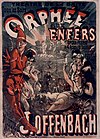Portal:Opera/Selected article/42
Orpheus in the Underworld is the English name for Orphée aux enfers, a comic opera composed by Jacques Offenbach to a libretto by Hector Crémieux and Ludovic Halévy. It was first performed as a two-act "opéra bouffon" at the Théâtre des Bouffes-Parisiens, Paris, on 21 October 1858, and was extensively revised and expanded in a four-act "opéra féerie" version, presented at the Théâtre de la Gaîté, Paris, on 7 February 1874. The opera is a lampoon of the ancient legend of Orpheus and Eurydice. In this version Orpheus is not the son of Apollo but a rustic violin teacher. He is glad to be rid of his wife, Eurydice, when she is abducted by the god of the underworld. Orpheus has to be bullied by Public Opinion into trying to rescue Eurydice. The reprehensible conduct of the gods of Olympus in the opera was widely seen as a veiled satire of the court and government of Napoleon III, Emperor of the French. Some critics expressed outrage at the librettists' disrespect for classic mythology and the composer's parody of Gluck's opera Orfeo ed Euridice; others praised the piece highly. In the late 19th century the Paris cabarets the Moulin Rouge and Folies Bergère adopted the music of the "Galop infernal" from the opera's culminating scene to accompany the can-can, and ever since the tune has been popularly associated with the dance.

